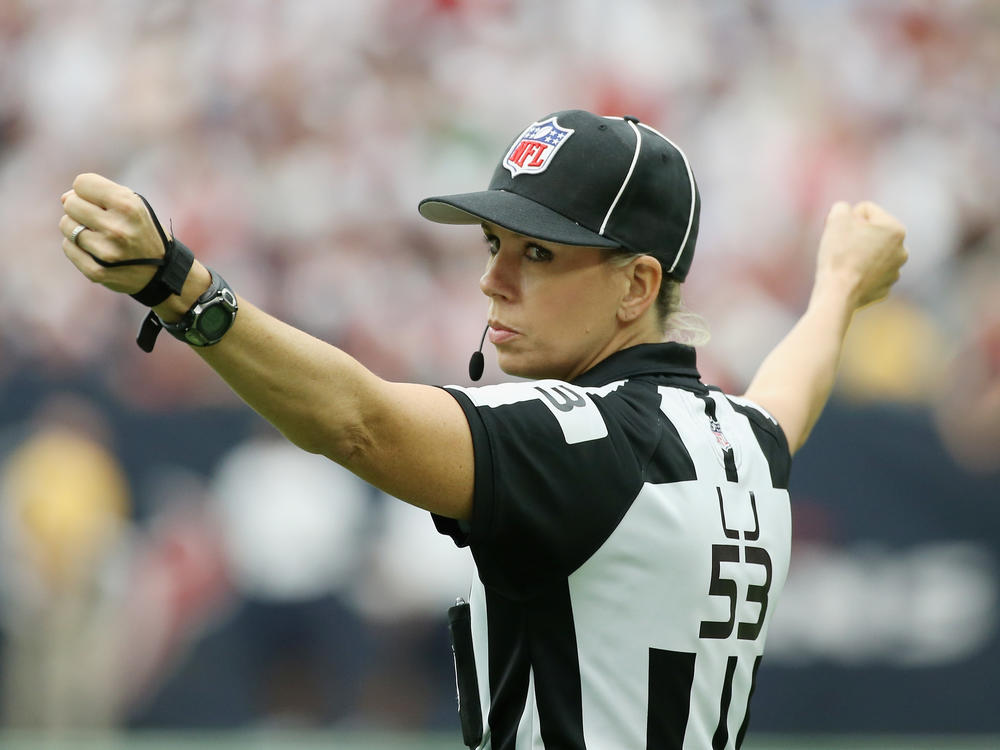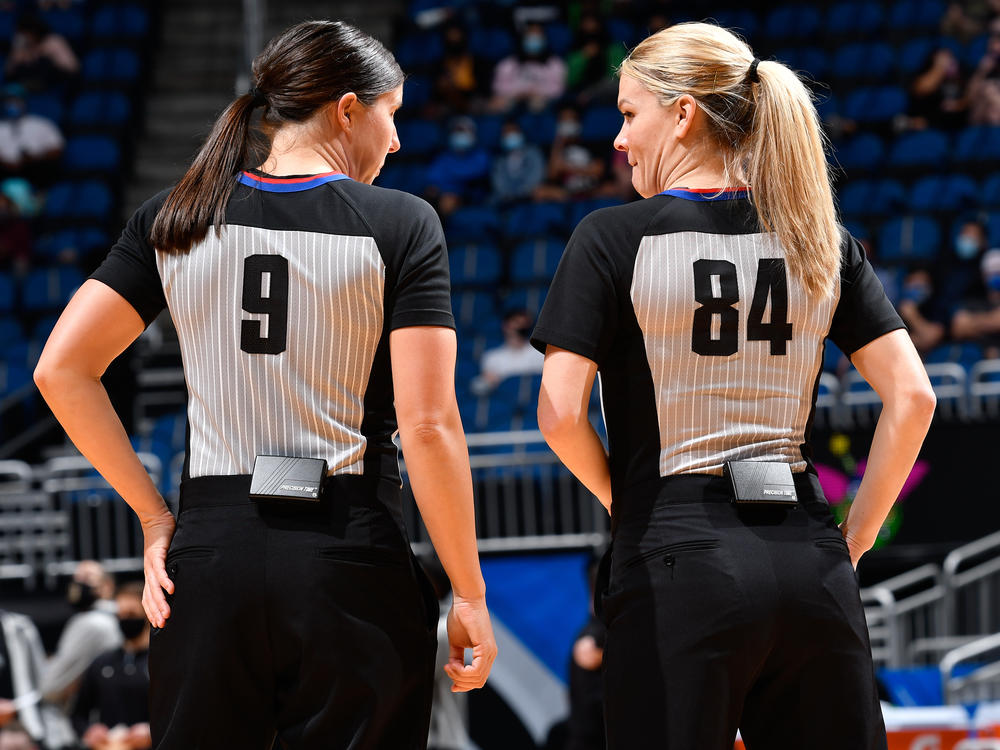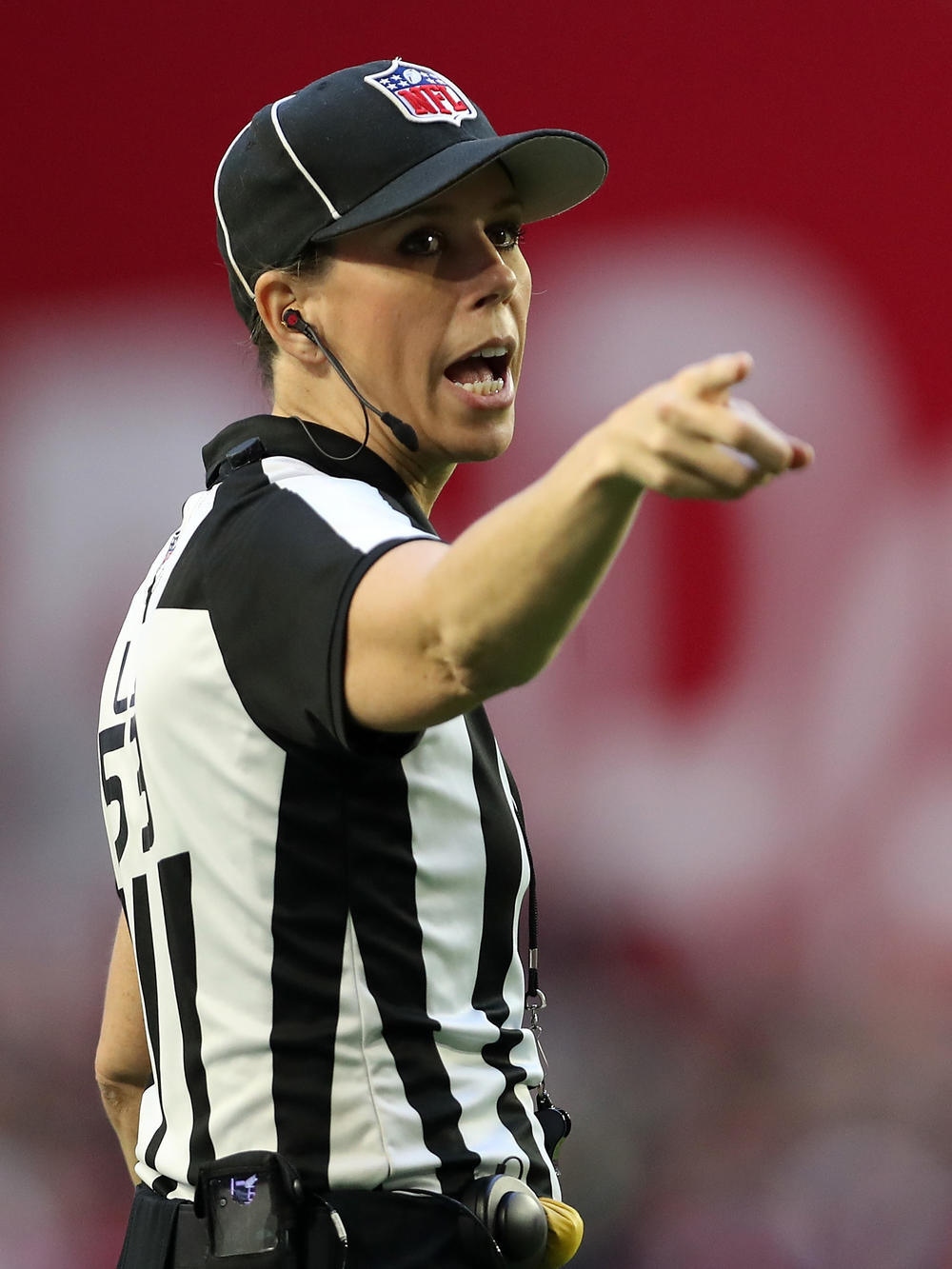Section Branding
Header Content
Referee Sarah Thomas Will Make Super Bowl History - But She's Part of a Trend
Primary Content
Sunday, the Super Bowl will offer up history when the Kansas City Chiefs play the Tampa Bay Buccaneers in Tampa.
That alone is historic. It's the first time a team has played a Super Bowl in its home stadium.
Another groundbreaking moment happens when Sarah Thomas takes the field in her black and white striped jersey. She'll be the first female official to work the NFL's biggest game.
It's history, but also part of a trend with more women officiating at the top levels of men's sports.
Historic pairing
A couple of Mondays ago, the Orlando Magic hosted the Charlotte Hornets in an NBA game with the usual three officials. But two were women. For the first time ever.
"It's cool to be running up and down the court and make that eye contact we make as partners on the floor," said referee Natalie Sago, "and it's like, oh, there's Jenna! There's another female out here with me, which is really fun and neat."
Sago and Jenna Schroeder worked the game in Orlando. It was historic but not completely foreign to Sago, now in her third year reffing NBA games. She says during her days in the NBA's minors, the G League, is wasn't uncommon to be part of an all-female officiating crew.
The NBA isn't there yet. But currently there are five full-time female refs, the most ever.
And it's a crowd compared to when Lauren Holtkamp-Sterling started officiating seven years ago. She's the senior member of the current group. Early in her career, she was the league's only female official, and trying to play it down.
"When I first started out," Holtkamp-Sterling said, "I really had a strong wish that I could just transcend gender. And that it would be all about the work. Just always about the work."
But try as she might, gender did emerge during her rookie season.
This might not be for her
In 2015, Holtkamp-Sterling was working a game when she called a technical foul on all-star guard Chris Paul.
Afterwards, Paul said Holtkamp-Sterling reacted too strongly to what he had said.
"We try to get the ball [in play] fast every time down the court," Paul explained to reporters, "and when we did that [Holtkamp-Sterling] said 'uh uh' and I said 'why uh uh?' and she gave me [a technical]. That's ridiculous. If that's the case, then this might not be for her."
This might not be for her.
The words caused a minor scandal. Paul was labelled a sexist – his player's union called that utterly ridiculous. The controversy did unleash a storm of social media reactions, including sexist comments about Holtkamp-Sterling. The referees union defended her by saying, "she belongs."
It was, she says, part of the "trial and error" of learning how to navigate the hyper-masculine environment of the NBA, as a female authority figure. Something all female officials have to do.
Sago says laying down the law with a bunch of alpha male athletes hasn't been as hard as some might think.
"Social media sometimes gives [players] a bad rap," Sago said, "but honestly night in and night out they are good to all of us. Just because they're 7'1 and 7'3 and big guys, the perception may be that [they're hard to handle], but it's not there. I'm not intimidated at all by these guys."
No need to blend in anymore
There's power in numbers too, finally, for female officials. Holtkamp-Sterling, who's married to fellow NBA ref Jonathan Sterling, says being five strong has changed the attitude she had earlier in her career.
"Particularly as I've seen Natalie and Jenna and Ashley [Moyer-Gleich] and Simone [Jelks] be hired," Holtkamp-Sterling said, "and I realize how powerful it is to be able to see myself reflected in them, when I see them work, and hopefully vice versa. I don't wish to blend in anymore and I don't think it's necessary to."
Also not blending in – Kathryn Nesbitt. Last December, in soccer's MLS Cup, she became the first woman to referee a championship match in North American men's professional sports.
And then of course, Sunday. Sarah Thomas will be part of a seven-person on-field team officiating the Super Bowl. Thomas started her NFL career as a Line Judge, but on the back of her jersey now, "DJ" stands for Down Judge. It's a different position and a relatively new title with an interesting gender-based history of its own.
Several years ago, Al Riveron, who was the NFL's senior director of officiating and a former NFL referee, noticed a woman...not Sarah Thomas...in the league's officiating development program. On her jersey, the letters "HL" were for the long-standing position of Head Linesman. As in Head Linesman.
"I just don't think it's right that we call anybody out by gender," Riveron said in a 2017 interview with SB Nation. "Especially in this day and age when we welcome everyone into football."
So he started a process that ended with a position name change to the gender-neutral Down Judge.
And Sarah Thomas is about to be the most talked about Down Judge in Super Bowl history. She will be on a global stage, understanding she's a first. But increasingly, not alone.
"When you start having more and more and more females," Thomas said in a recent NFL interview, "no one's doing it for the recognition. They are doing it because they love it."
Thomas says it wasn't necessarily a goal to work a Super Bowl. The goal was to be number one at her position.
Another glass ceiling broken. Another door opened.
And at the root of it, as with all the female officials finding their footing in male-dominated sports, is an intense desire to simply call a great game.
Copyright 2021 NPR. To see more, visit https://www.npr.org.



